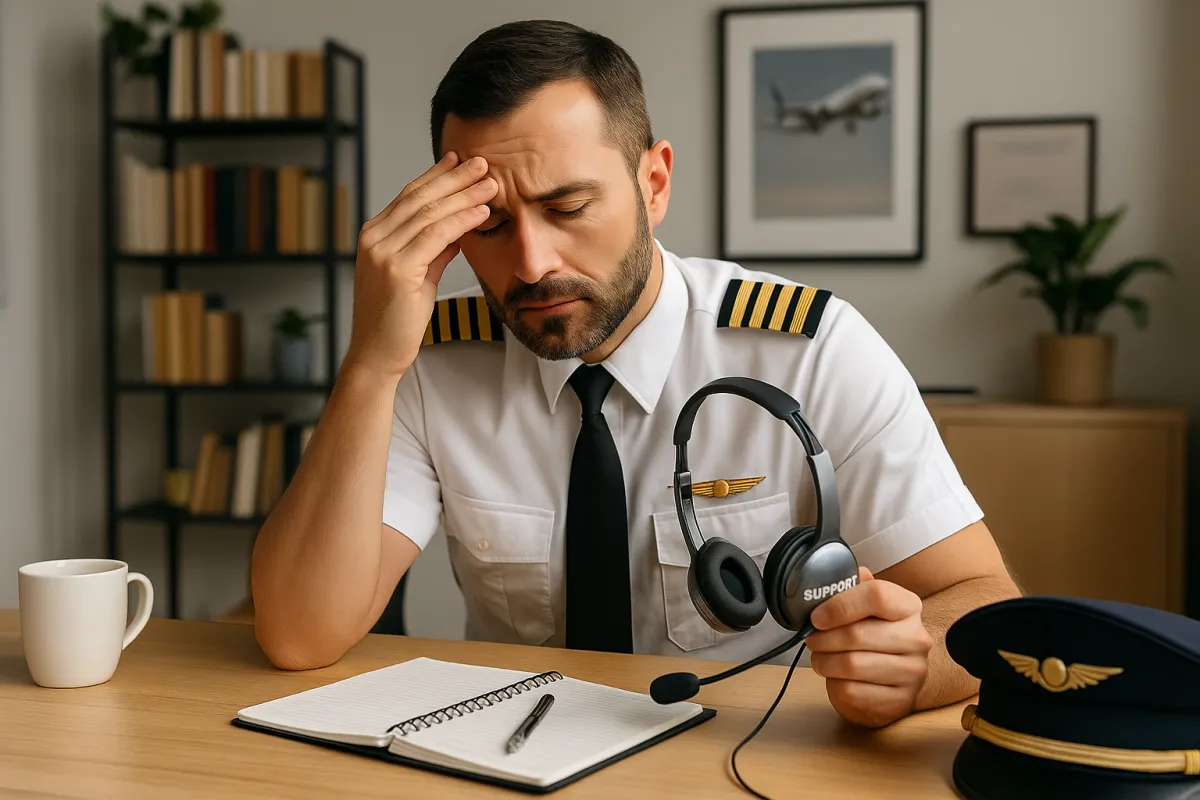Blog

Essential Pilot Mental Health Resources for Better Wellness
Pilot Mental Health Resources: Comprehensive Support and Stress Management Techniques for Aviators
A Trusted Guide to Therapy, FAA Certification, Crisis Services, and Resilience in Aviation
Mental health in aviation is no longer a behind-the-scenes concern—it’s a frontline safety issue. Whether in the cockpit, on the ramp, or directing traffic from a tower, aviation professionals face a spectrum of psychological challenges that demand thoughtful, confidential care. From managing chronic stress and depression to navigating substance abuse, bipolar disorder, or trauma from domestic violence or crisis situations, pilots and aircrew deserve access to informed, compassionate, and safe support.
Clinicians like Stephen Rought, who specialize in aviation mental health, offer evidence-based therapy options tailored to the regulatory and cultural realities of flight crews and air traffic professionals. This guide outlines trusted resources, regulatory guidance, and wellness techniques to help pilots and aviation professionals prioritize their mental health—without fear of compromising their careers.
What Are the Common Mental Health Challenges Faced by Pilots?
Pilots, flight attendants, and aircrew operate in an environment where composure is essential, but chronic exposure to stress can quietly erode resilience. Common challenges include:
•Anxiety and panic attacks
•Depression and bipolar disorder
•Addiction and substance abuse (especially involving alcohol or sleep aids)
•Fatigue, sleep disruption, and performance-related stress
•Trauma, including exposure to violence, harassment, or critical in-flight incidents
•Concerns about FAA medical certification and privacy when seeking support
Which Stressors Impact Pilot Mental Health Most?
Major stressors in aviation include:
•Long and unpredictable work hours
•Isolation during overnight or international rotations
•Fear of mental health disclosure and losing one’s medical certificate
•Exposure to crisis situations, including in-flight emergencies or threats
•Health insurance coverage confusion for therapy or medication
•Ongoing pressure to perform flawlessly in dynamic environments
How Do Anxiety and Depression Affect Pilots?
Anxiety may present as:
•Overanalyzing or second-guessing decisions in the cockpit
•Physical symptoms like tension, headaches, or shortness of breath
•Avoidance of certain aircraft types or flight duties
Depression may appear as:
•Emotional numbness, fatigue, or disinterest in flying
•Irritability and relationship strain with crew or family
•Risky behaviors, alcohol misuse, or thoughts of withdrawal from aviation
When untreated, these disorders can impair attention, communication, and decision-making in flight.
What Are the Signs and Symptoms of Pilot Burnout?
•Persistent fatigue despite rest
•Feeling “checked out” during procedures or CRM
•Short temper, emotional volatility, or cynicism
•Trouble concentrating in pre-flight or in-flight environments
•Desire to isolate from crew, family, or support networks
Burnout may also emerge as subtle performance decline or uncharacteristic behavior—important red flags for both pilots and supervisors.
What Are Effective Pilot Stress Management Techniques?
•Cognitive Behavioral Therapy (CBT) to reframe stress-inducing thoughts
•Mindfulness and breathwork to stay grounded during cruise
•Peer support programs for confidential emotional check-ins
•FAA-approved therapy for targeted recovery without career jeopardy
•Crisis intervention resources for acute emotional distress
These techniques are even more effective when supported by structured mental health services and proactive flight department policies.
How Can Pilots Access Mental Health Support and Therapy?
Pilots can connect with:
•Aviation medical examiners (AMEs) with mental health experience
•Licensed therapists familiar with FAA medical certification processes, offering individual counseling or other specialized therapies
•Employee Assistance Programs (EAPs) for short-term therapy and referrals
•Specialized providers like Stephen Rought, offering confidential, FAA-informed therapy
•Online directories and support networks that serve aviation professionals and first responders
What Types of Therapy and Counseling Are Available for Pilots?
•CBT, mindfulness-based therapy, and exposure therapy
•Counseling for post-traumatic stress, substance use, or suicidal ideation
•Crisis intervention counseling following critical incidents
•Support for relationship or family stress, including domestic violence recovery
•Therapy tailored for bipolar disorder, depressive disorders, or complex trauma
Medication (e.g., antidepressants) may be FAA-permitted with proper documentation and monitoring.
How Does Confidential Telehealth Support Benefit Aviators?
•Therapy from anywhere—hotel, base, or home
•Greater scheduling flexibility
•Reduced social stigma or fear of being seen seeking help
•Private access to therapists who understand aviation safety and certification standards
•Easy documentation for those navigating FAA mental health clearance
Where Can Pilots Find Specialized Mental Health Programs?
•SAMHSA National Helpline (1-800-662-HELP)
•The Trevor Project (LGBTQIA+ mental health and suicide prevention)
•Airline and union peer support networks
•Depression and Bipolar Support Alliance (DBSA) for chronic mood disorder management
•Aerospace Medical Association for research and provider directories
How Do Peer Support Programs Enhance Pilot Mental Health?
•Offer confidential, non-clinical conversations with trained peers
•Identify early symptoms of burnout, addiction, or mental fatigue
•Reduce isolation among pilots, flight attendants, and aircrew
•Serve as a first step before formal therapy
•Empower proactive wellness rather than crisis reaction
What Is Peer Support for Pilots and How Does It Work?
Peer support programs train experienced pilots and aircrew to:
•Listen without judgment
•Share personal experience and resilience tools
•Refer to licensed professionals when needed
•Support colleagues through career setbacks, personal loss, or mental health emergencies
Conversations are confidential unless safety concerns require action.
How Can Pilots Join or Build Aviation Peer Support Groups?
•Contact your union, airline, or safety team
•Volunteer for peer listener training
•Attend aviation mental wellness workshops
•Encourage integration of peer support into crew resource management programs
What Are the Benefits of Pilot Mentorship Programs?
•Reduce stress for new pilots or those transitioning aircraft
•Create supportive relationships outside formal supervision
•Offer career and emotional guidance from experienced aviators
•Help normalize mental health conversations in aviation culture
What Are the FAA Regulations and Reporting Procedures Related to Pilot Mental Health?
How Do FAA Medical Certifications Address Mental Health?
The FAA recognizes that mental health conditions are manageable and certifiable. Key points:
•Treatment (including with certain antidepressants) may be approved
•Disclosure does not mean disqualification—but honesty is required
•Aviation medical examiners review mental health history during renewal exams
•Behavioral health documentation may be requested to maintain eligibility
What Are the Guidelines for Reporting Mental Health Concerns?
•Pilots should disclose treatment honestly during medical certification
•Many conditions are waiverable with stability and compliance
•Working with an aviation-informed therapist ensures the right language and context is used
•Seek informed guidance before discontinuing medication or avoiding disclosure
How Does the Aviation Safety Reporting System (ASRS) Support Mental Health?
•Pilots can anonymously report safety-related incidents, including those tied to fatigue or emotional strain
•ASRS protects identities and promotes advocacy-driven safety policy
•These reports inform FAA rulemaking and wellness best practices
What Resources and Tools Are Available for Ongoing Pilot Mental Health Awareness?
•Articles and webinars from Stephen Rought, ALPA, and the FAA
•Interactive tools and self-assessments via mobile apps
•Guided meditations, stress tracking, and CBT exercises for pilots
•Crisis Text Line (Text HELLO to 741741) for 24/7 anonymous help
•Alcohol and addiction screening tools from EAPs or DBSA
How Can Aviation Psychologists Support Mental Wellness?
•Provide diagnostic clarity for mood and anxiety disorders
•Offer therapy designed to align with aviation safety demands
•Assist with FAA documentation and long-term treatment planning
•Help manage fear, trauma, or behavioral shifts after critical incidents
•Lead airline-based training or education on mental wellness and advocacy
Final Thoughts: Mental Wellness Is a Flight Safety System
A mentally fit pilot is a safer pilot—and a more fulfilled one. Mental health support in aviation isn’t a liability; it’s a lifeline. Whether you're navigating anxiety, addiction, burnout, or complex emotional stressors, there are confidential, informed, and FAA-compliant ways to get the help you deserve.
If you’re not sure where to start, reach out to a peer. Or contact a therapist like Stephen Rought, who speaks the language of both aviation and psychology. Because in the air or on the ground, your safety starts with your mind.

Stephen Rought, LCSW
Proudly Accepting
Aetna and Medicare Insurance


Disclaimer
Stephen Rought, LCSW does not guarantee any specific outcome. All content provided on the Stephen Rought, LCSW website is provided for educational or informational purposes only. Consult medical professionals you are working with about whether any opinions or recommendations provided through this website apply to you and your unique circumstances
Currently, all online therapy sessions are conducted using the HIPPA compliant Telehealth service doxy.me
SErvices
Individual Therapy
Parent Coaching
Financial Therapy
Couples Counseling
Family Therapy
